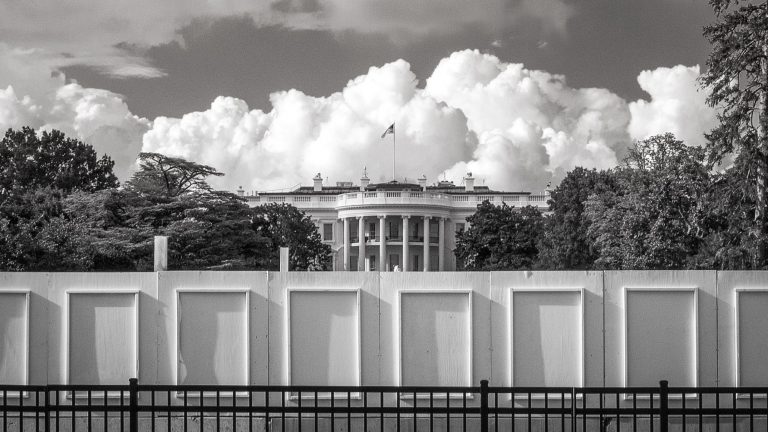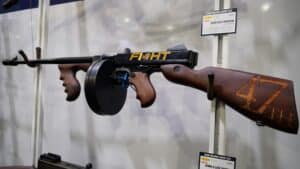President Joe Biden doubled down on his gun-control efforts while opening $350 billion in funding for localities to hire police officers in response to rising crime across the country.
The president renewed his call on Wednesday for Congress to pass an “assault weapons” ban as well as a nationwide “red flag” law in a White House document detailing a mix of new and continuing efforts to deal with 2021’s 24 percent surge in murder. He also called on Congress to repeal the Protection of Lawful Commerce in Arms Act or for states to pass their own laws circumventing it, in order to hold gun makers liable to criminal acts committed with guns by third parties. Biden’s strategy focuses primarily, though not exclusively, on increasing enforcement efforts against gun makers and dealers as a way of limiting gun crime.
In addition to calls for new gun-control legislation, the administration is undertaking a number of initiatives under current law. It announced a new “zero-tolerance” policy for licensed gun dealers who “willfully” violate federal law. The ATF will now also be required to share more of its inspection data with state agencies and the public. And it will be forming “strike forces” with state and local law enforcement to target interstate gun-trafficking operations.
The strategy is the White House’s first attempt to formulate a comprehensive plan to slow the increase in violent crime as America emerges from a tumultuous 18 months scarred by the coronavirus pandemic as well as racial and political unrest. Violent crime in the United States has declined dramatically from record levels in the 1980s and 90s, and even with the recent surge still remains well below those records. A report from the National Commission on COVID-19 and Criminal Justice, cited by the White House, found there were 11.4 homicides per 100,000 residents in 34 major American cities in 2020 versus 19.4 per 100,000 in 1995.
Whether Biden can prevent the recent crime spike from rising to the levels seen 30 years ago will be a defining question of his presidency.
The administration’s focus on gun makers and dealers is unlikely to have an immediate impact on crime since the ATF data have long shown the average gun recovered at a crime scene was sold many years beforehand and likely changed hands several times. The agency’s most recent report on time-to-crime data found there was an average of 8.29 years between sales and crime. Additionally, a 2016 University of Chicago survey of inmates convicted of gun crimes found the vast majority did not legally purchase their firearms from licensed dealers or at gun shows but instead relied on getting guns from people they knew, illegal street dealers, or by stealing them.
However, the administration is pursuing a number of other initiatives beyond tightening regulations on gun makers and dealers. The plan also opens up $350 billion from the American Rescue Plan (ARP) for state and local officials to hire police officers at a rate “even above pre-pandemic levels,” as Biden abandons recent progressive orthodoxy and tries to increase funding for police rather than cut it. The plan would also allow localities to use the money for “paying overtime where the funds are directly focused on advancing community policing strategies in those communities experiencing an increase in gun violence associated with the pandemic.”
“Any community may use ARP funds to rehire police officers and other public servants to restore law enforcement and courts to their pre-pandemic levels,” the White House said.
The same funds will also be made available to community violence intervention (CVI) programs that use community members instead of police to try and prevent conflicts from escalating into violence. The administration is focusing funding on programs in major cities that have experienced significant murder spikes, including Atlanta, Baltimore, Chicago, Detroit, Los Angeles, Minneapolis, and Philadelphia. It plans to work directly with those localities to create a plan for an expected increase in violence this summer.
“Today, the President is announcing that the Administration will convene and support a CVI Collaborative of 15 jurisdictions that are committing to use a portion of their ARP funding or other public funding to increase investment in their CVI infrastructure, including to anticipate and respond to the potential rise in violence this summer,” the White House said.
The administration also opened up ARP funds to summer camps and job programs for at-risk youth, as well as housing and substance abuse programs “for victims of crime, young people, formerly incarcerated persons, and individuals and households facing economic insecurity due to the pandemic.” In addition, the strategy includes several initiatives designed to incentivize employers and government agencies to hire former convicts. It also provides those released from prison with emergency housing vouchers using ARP funds.







Only Members can view comments. Become a member today to join the conversation.